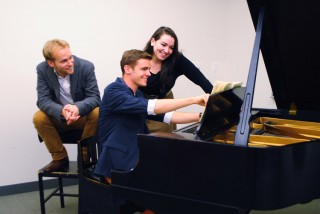Title

Lachlan Glen (at the piano) practices with his Schubert & Co. collaborators Jonathan Ware and Raquel Gonzalez.
(Photo by Monica Thakkar)Franz Schubert (1797-1828) was perhaps the most influential figure in the development of the lied—he wrote more than 600 songs in his short life. Brahms later wrote, “there is no song of Schubert’s from which one cannot learn something.” So you’d think it wouldn’t be hard to find his complete songs—like, say, you can easily find any number of editions of Shakespeare’s greatest works (hardback, paperback, Kindle, annotated, single volume, multivolume, etc.). But if you type “Schubert complete songs” into your Amazon.com search bar, you’ll find only a few complete recordings, and not a single immediately available edition of the complete printed music for these songs.
Body
It was that reality that prompted me— in a Czech bar in Zwickau, Germany, last summer—to propose to my friend Jonathan Ware (M.M. ’09, collaborative piano) that we join forces to present these songs in their entirety to New York City. After a few laughs—how could two guys in their 20s execute as enormous an undertaking as this?—we started wondering whether, with good-enough planning, this idea could become a reality.
We put out a few feelers, and the response was extraordinary. Pianists Graham Johnson (who recorded the complete Schubert lieder for Hyperion Records) and Malcolm Martineau both responded enthusiastically but with the caution to seriously consider what we were getting ourselves into. When I called Brian Zeger, artistic director of Juilliard’s Marcus Institute for Vocal Arts, to discuss the proposition with him, I was met with the stunned silence I had anticipated, but it was quickly followed by an offer to do whatever he could to help. Since then, his generous support for the project, as well as that of Juilliard faculty members Margo Garrett and J. J. Penna, has enabled us to overcome many obstacles.
Having received this encouragement from our mentors, Jonathan and I e-mailed 75 singers, figuring we would need 55 for the project. Within 48 hours, more than 50 responded—from Juilliard, Curtis, the Manhattan School, and young artist programs at the Houston Grand, Chicago Lyric, and Metropolitan opera houses. Jonathan proposed the name Schubert & Co., and we started planning in earnest.
First, we calculated that we would need to program 31 recitals, 75 minutes each, to cover all 600-plus songs, which range from single-verse miniatures (under 60 seconds) to monstrous 25-minute scenes. Then came the issue of programming: Should it be chronological (unwise since it was likely we would be rescheduling periodically), or by theme, style/era of poetry, or nationality of poet? Eventually we decided to use the poets as a beacon to guide us through these works, as that not only let us focus on each writer but also gave us more arranging and scheduling flexibility.
Once we had created the programs and set up dates from September 20 to May 2, we started assigning songs based on the schedules and strengths of the singers. The fact that they were willing to do this without charge—and that Central Presbyterian Church offered us its beautiful space for almost all the recitals—meant we could present the concerts for free, but we would still need funding. We created a Web site, a Facebook page, and a Kickstarter project to raise funds for our initial costs. We also started contacting publicists, creating flyers and other advertising materials, and spreading the word.
Schubert & Co.’s opening festival, which took place the last weekend in September, began with soprano Graduate Diploma candidate Simone Easthope and bass-baritone Evan Hughes (who’s in the Metropolitan Opera’s Lindemann young artist program) singing a survey of Schubert songs from “Erlkönig” to “Nacht und Träume.” The next day, first-year master’s soprano Raquel Gonzalez presented an afternoon recital of songs with texts of Goethe, followed that evening by Die Schöne Müllerin sung by tenor William Ferguson accompanied by Zeger. We were thrilled with the audience’s response. Faculty member Sanford Sylvan, a baritone, who will be performing Winterreise with Zeger at the December 1 concert, later told The Journal, “in a musical world which, seemingly, turns away from the kind of richness and diversity of recital experience that my generation grew up with, it is deeply heartening and certainly inspiring to witness these young people take on the complete songs of Schubert.”
Many of the texts Schubert set involve the interactions of various characters (the famous Erlkönig consists primarily of dialogue between a father and his son, and the boy and the Erl-King himself). While these songs were for the most part written as solo lieder, we are exploring the dramatic possibilities of having them presented by multiple singers. Other examples of such presentations include several of the denser dialogue-based texts of Ossian.
There are specific challenges associated with studying and presenting music that is roughly 200 years old but has never entered the mainstream art song repertory. “Learning and performing a piece the audience—and myself—have no preconceptions about is exciting and terrifying,” Gonzalez said. “The freedom to introduce a new piece to the audience is thrilling. They don’t have any ideas about the way it should be performed, the traditions that should or shouldn’t be upheld, and the type of voice that sings that song the best. The disadvantage is a different side of the same coin: When you don’t have any references for the piece, you’re grasping in the dark for the tempo, the mood. Which means you get to decide what works best for the piece and for you as a performer. The text is yours; the music is yours.”




